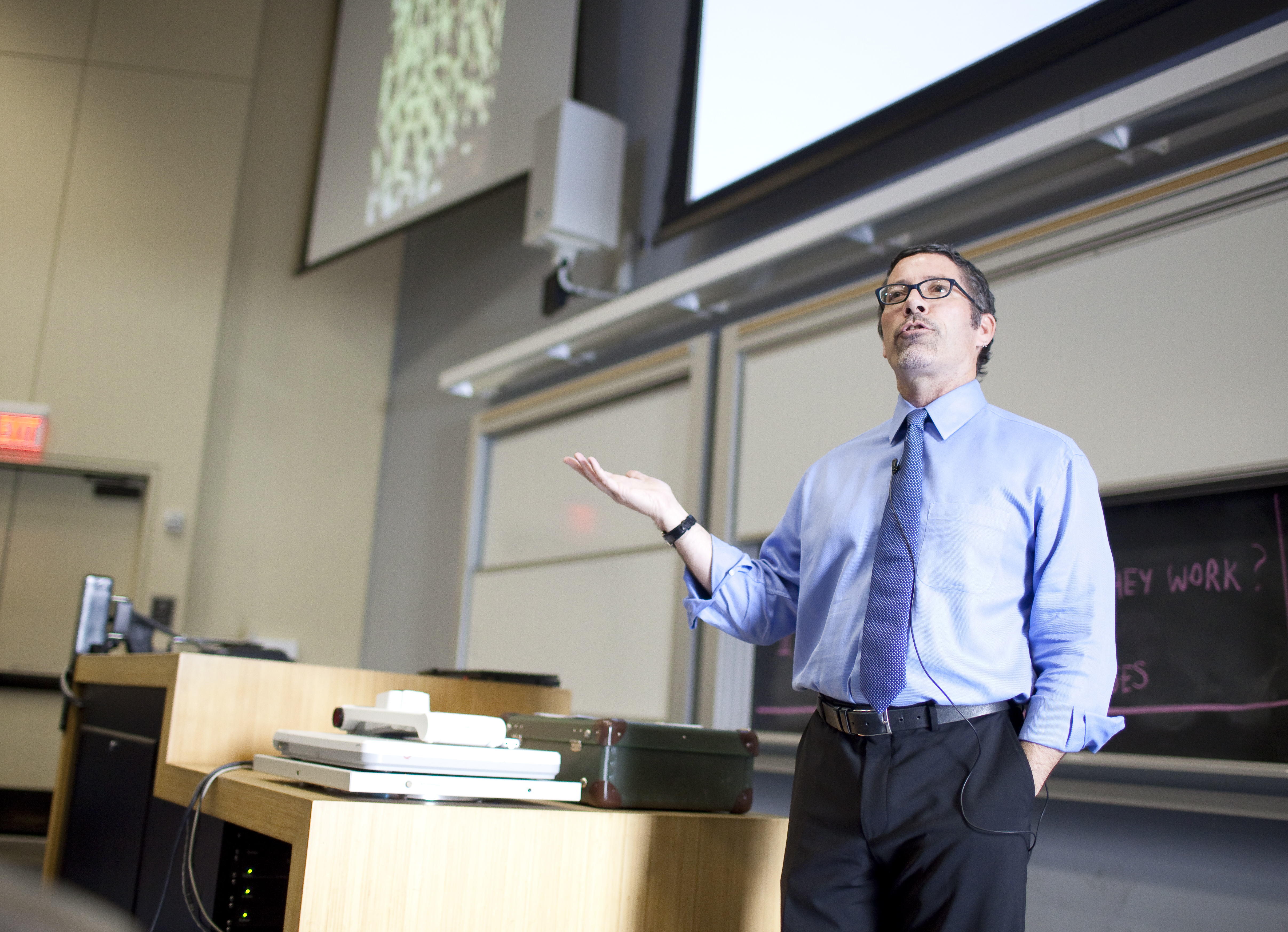Professor offers insight into human behavior

Jay Phelan, a professor and evolutionary biologist in the life sciences department at UCLA, speaks in a lecture. Phelan recently co-authored the second edition of “Mean Genes: From Sex to Money to Food: Taming Our Primal Instincts” with Chapman University professor Terry Burnham.
By Chandini Soni
Nov. 26, 2012 12:58 a.m.
Dressed in a suit with two earrings in his left ear, Jay Phelan reclined back in his chair and put his feet up on his desk as he talked about a few of his favorite things: data, science and teaching.
His office is full of books and magazines about science. The walls are decorated with magazine covers, pictures and artwork made by his three sons.
Although the processes involved in evolution have been contested by scientists over the years, Phelan, a professor of life sciences, said he thinks the answers to many questions about modern behavior ““ like how and why we save money ““ can be found in our distant evolutionary history.
In 2001, he co-authored the book, “Mean Genes: From Sex to Money to Food: Taming Our Primal Instincts,” with Chapman University professor Terry Burnham. The duo released the second edition of the book in October.
Phelan and Burnham came up with the idea for “Mean Genes” when they were teaching a class together at Harvard. Burnham said that they thought the material covered in the class would be useful to anyone.
Phelan uses this book as a supplement to teach his favorite class ““ Life Sciences 15, Life: Concepts and Issues. He said he enjoys teaching the class because it is suited for both science and non-science students.
“The world today is increasingly scientific. Like it or not, you’re going to encounter science. You’ve got to know (how to use it),” Phelan said.
Molly Hodul, a third-year psychology student, took Life Sciences 15 with Phelan in spring 2011. She said most science classes she has taken focus on the scientific method. But Phelan’s class also teaches students how to look at scientific evidence.
“(Most) other science courses are really drill and kill,” Hodul said. “(Phelan makes you understand that) there is a lot of science that we don’t know yet.”
Gary Bucciarelli, an ecology and evolutionary biology graduate student and teaching assistant for Phelan, said his class helps students contextualize science in their day-to-day lives.
“(Talking to Phelan is) like talking to a scientist who can talk to people,” Bucciarelli added.
Having taught the course several times, Phelan continuously aims to improve his course material.
“(He is) not bored when he goes in there (to teach). It’s a contact sport (for him),” Burnham said.
Phelan and Burnham’s book, “Mean Genes” aims to give insight into human behavior and to further apply the scientific method to daily life, Phelan said.
“(“˜Mean Genes’) is a way of using information about human’s evolutionary history to gain insight into how to better understand the problems we have in the modern world,” said Phelan, who holds a bachelor’s degree in biology from UCLA. “(It is) our way of trying to get people to use scientific information to be happy.”
The book covers topics including infidelity, beauty, drugs and debt. According to the book, people overeat partly because human ancestors had too little food and no reliable storage technology.
“Our brains are still evolved to the hunter-gatherer instinct,” Phelan said.
For instance, the inability of humans to save money works on the same principle. One solution, the authors state, is to “hide” the money by putting it in a bank account that is not easily
accessible.
Phelan said he enjoys testing theories and figuring out why things happen. He even takes this interest beyond the classroom
and into his home.
Phelan said once when he and his wife went shopping for vanilla essence to bake cookies, they got into an argument about whether real or artificial vanilla essence was better. He then decided to put it to the test with an
experiment.
He made his wife taste cookies with both types of vanilla while blindfolded. Though she initially refused to give in, Phelan said he overheard her at a party admitting he was right ““ that artificial vanilla essence tastes exactly the same as the natural variation.
“(Science) is a way of thinking that tells you when to change your mind,” he said. “For my personality, I can’t not be a scientist.”
In his spare time, he updates his website, Jay’s Movie Database, on which he and three other people rate movies. Phelan has rated more than 3,500 movies so far, according to his website.
Email Soni at [email protected]

